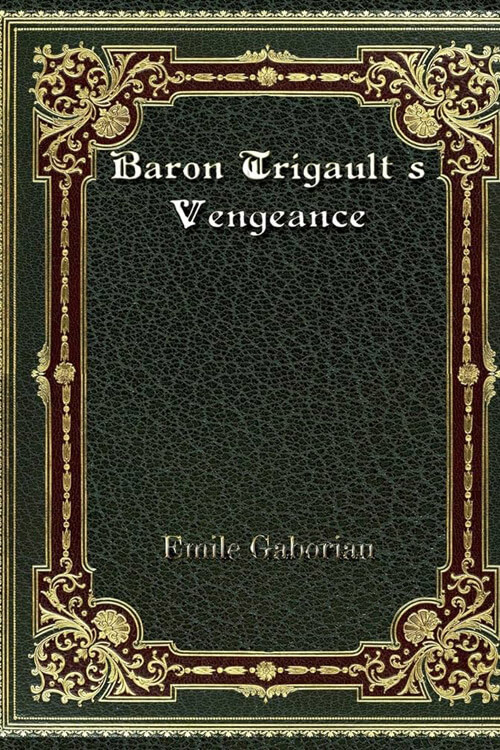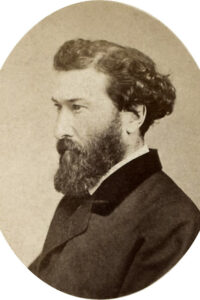
Baron Trigault’s Vengeance
Vengeance! That is the first, the only thought when a man finds himself victimized, when his honour and fortune, his present and future, are wrecked by a vile conspiracy! The torment he endures under such circumstances can only be alleviated by the prospect of inflicting them a hundredfold upon his persecutors. And nothing seems impossible at first, when hatred surges in the brain, and the foam of anger rises to the lips; no obstacle seems impossible, or, rather, none are perceived. But later, when the faculties have regained their equilibrium, one can measure the distance that separates the dream from reality, the project from execution.
And on setting to work, how many discouragements arise! The fever of revolt passes by, and the victim wavers. He still breathes bitter vengeance, but he does not act. He despairs and asks himself what would be the good of it. And in this way, the success of villainy is once more assured. Similar despondency attacked Pascal Derailleur when he awoke for the first time in the abode where he had hidden under the name of Maumejan. A frightful slander had crushed him to the earth−−he could kill his slanderer, but afterwards−−? How was he to reach and stifle the slander itself? Also, try to hold a handful of water; try to stay with extended arms while the progress of the poisonous breeze wafts an epidemic on its wings.
So the hope that had momentarily lightened his heart faded away again. Since he had received that fatal letter from Madame Leon the evening before, he believed that Marguerite was lost to him forever, and in this case, it was useless to struggle against fate. What would be the use of victory even if he conquered? Marguerite lost to him−−what did the rest matter? Ah! If he had been alone in the world. But he had his mother to think of;−−he belonged to this brave−hearted woman who had saved him from suicide already. “I will not yield, then; I will struggle on for her sake,” he muttered, like a man who foresees the futility of his efforts. He rose and had nearly finished dressing when he heard a rap at his chamber door. “It is I, my son,” said Madame Ferailleur outside. Pascal hastened to admit her.
“I have come for you because the woman you spoke about last evening is already here, and before employing her, I want your advice.”
“Then the woman doesn’t please you, mother?”
“I want you to see her.”
On entering the little parlour with his mother, Pascal found himself in the presence of a portly, pale−faced woman with thin lips and restless eyes who bowed obsequiously. She said that it was indeed Madame Vantrasson, the landlady of the model lodging house, who was seeking employment for the three or four hours that were at her disposal in the morning. It certainly was not for pleasure that she had decided to go out to service again; her dignity suffered terribly by this fall−−but then the stomach has to be cared for. Tenants were not numerous at the model lodging− house, despite its seductive title, and those who slept there occasionally almost invariably succeeded in stealing something. Nor did the grocery store pay; the few half−pence which were left there occasionally in exchange for a glass of liquor were pocketed by Vantrasson, who spent them at some neighbouring establishment, for it is a well−known fact that the wine a man drinks in his shop is always bitter in flavour. So, having no credit at the butcher’s or the baker’s, Madame Vantrasson was sometimes reduced to living for days together upon the contents of the shop−−mouldy figs or dry raisins−−which she washed down with torrents of ratafia, her only consolation here below. But this was not a satisfying diet, as she was forced to confess, so she decided to find work that would furnish her with food and a little money, which she vowed she would never allow her worthy husband to see.
“What would you charge per month?” inquired Pascal.
She seemed to reflect, and after a great deal of counting on her fingers, she finally declared that she would be content with breakfast and fifteen francs a month on condition she was allowed to do the marketing. When presenting themselves in a situation, French cooks’ first question is almost invariably, “Shall I do the marketing?” which means,
“Shall I have any opportunities for stealing?” Everybody knows this, and nobody is astonished at it.
“I shall do the marketing myself,” avowed Madame Derailleur.
“Then I shall want thirty francs a month,” replied Madame Vantrasson promptly.
Read or download Book
Emile Gaboriau
Émile Gaboriau (9 November 1832 – 28 September 1873) was a French writer, novelist, journalist, and a pioneer of detective fiction.
Biography.
Gaboriau was born in the small town of Saujon, Charente-Maritime. He was the son of Charles Gabriel Gaboriau, a public official, and his mother was Marguerite Stéphanie Gaboriau. Gaboriau became a secretary to Paul Féval and, after publishing some novels and miscellaneous writings, found his natural gift in L’Affaire Lerouge (1866).
Literary life
Gaboriau’s novel L’Affaire Lerouge is widely considered the first detective story in France. Its structure is a flashback into the past that informs a present mystery. Influenced by Baudelaire’s translations of the stories of Edgar Allan Poe, This work introduced an amateur detective, and a young police officer named Monsieur Lecoq, who was the hero in three of Gaboriau’s later detective novels. The character of Lecoq was based on a real-life thief turned police officer, Eugène François Vidocq (1775–1857), whose own memoirs, Les Vrais Mémoires de Vidocq, mixed fiction and fact. It may also have been influenced by the villainous Monsieur Lecoq, one of the main protagonists of Féval’s Les Habits Noirs book series. Gaboriau was likely influenced also by the philosophy of positivism, promoted by Auguste Comte, which promoted the idea that science could answer all questions. Gaboriau’s investigators rely heavily on newly developing scientific methodologies in pursuing criminals rather than simply on interrogation and eyewitnesses.
L’Affaire Lerouge was published as a series in the daily Le Soleil and at once made his reputation. Its recounting of a reclusive woman murdered for the secret she hides gained Gaboriau a considerable following. But when Arthur Conan Doyle created Sherlock Holmes, Monsieur Lecoq’s international fame declined. The story was produced on the stage in 1872. A long series of novels dealing with the annals of the police court followed and proved very popular. Gaboriau died in Paris of pulmonary apoplexy.
Gaboriau’s books were generally well-received. About The Mystery of the Orcival, Harper wrote in 1872: “Of its class of romance—French sensational—this is a remarkable and unique specimen”. A film version of Le Dossier n° 113 (File No. 113) was released in 1932.
In A Study in Scarlet, Arthur Conan Doyle has Watson ask Sherlock Holmes what he thinks of Gaboriau’s work. Holmes disparages Lecoq as “a miserable bungler”.






